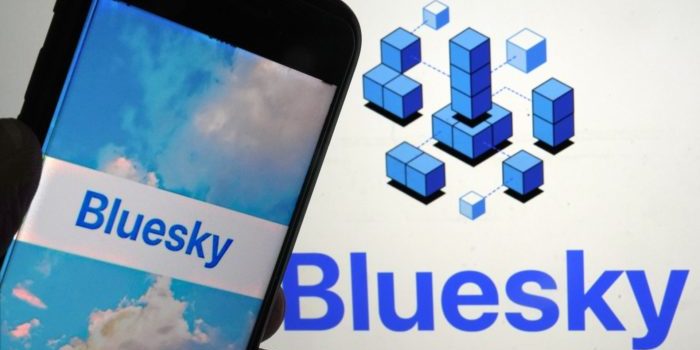(Headline USA) Little data has emerged to help quantify the rise in impersonator accounts and artificial intelligence-fueled networks on Bluesky.
But in recent weeks, users have begun reporting large numbers of apparent AI bots following them, posting plagiarized articles or making seemingly automated divisive comments in replies.
Lion Cassens, a Bluesky user, found one such network by accident—a group of German-language accounts with similar bios and AI-generated profile pictures posting in replies to three German newspapers.
“I noticed some weird replies under a news post by the German newspaper ‘Die Ziet,’” he said in an email to The Associated Press. “I have a lot of trust in the moderation mechanism on Bluesky, especially compared to Twitter since the layoffs and due to Musk’s more radical stance on freedom of speech. But AI bots are a big challenge, as they will only improve. I hope social media can keep up with that.”
Cassens said the bots’ messages have been relatively innocuous so far, but he was concerned about how they could be repurposed in the future to mislead.
There are also alleged signs that foreign disinformation narratives have made their way to Bluesky. The disinformation research group Alethea pointed to one low-traction post sharing a false claim about ABC News that had circulated on Russian Telegram channels.
Copycat accounts are another challenge. In late November, Alexios Mantzarlis, director of the Security, Trust and Safety Initiative at Cornell Tech, found that of the top 100 most followed named individuals on Bluesky, 44% had at least one duplicate account posing as them.
Two weeks later, Mantzarlis said Bluesky had removed around two-thirds of the duplicate accounts he’d initially detected—a sign the site was aware of the issue and attempting to address it.
Bluesky posted earlier this month that it had quadrupled its moderation team to keep up with its growing user base.
The company also announced it had introduced a new system to detect impersonation and was working to improve its Community Guidelines to provide more detail on what’s allowed.
Because of the way the site is built, users also have the option to subscribe to third-party “Labelers” that outsource content moderation by tagging accounts with warnings and context.
The company didn’t respond to multiple requests for comment for this story.
Even as its challenges aren’t yet at the scale other platforms face, Bluesky is at a “crossroads,” said Edward Perez, a board member at the nonpartisan nonprofit OSET Institute, who previously led Twitter’s civic integrity team.
“Whether BlueSky likes it or not, it is being pulled into the real world,” Perez said, noting that it needs to quickly prioritize threats and work to mitigate them if it hopes to continue to grow.
That said, disinformation and bots won’t be Bluesky’s only challenges in the months and years to come. As a text-based social network, its entire premise is falling out of favor with younger generations.
A recent Pew Research Center poll found that only 17% of American teenagers used X, for instance, down from 23% in 2022. For teens and young adults, TikTok, Instagram and other visual-focused platforms are the places to be.
Political polarization is also going against Bluesky ever reaching the size of TikTok, Instagram or even X.
“Bluesky is not trying to be all things to all people,” Wardle said, adding that, likely, the days of a Facebook or Instagram emerging where they’re “trying to keep everybody happy” are over.
Social platforms are increasingly splintered along political lines and when they aren’t—see Meta’s platforms—the companies behind them are actively working to de-emphasize political content and news.
Adapted from reporting by the Associated Press

